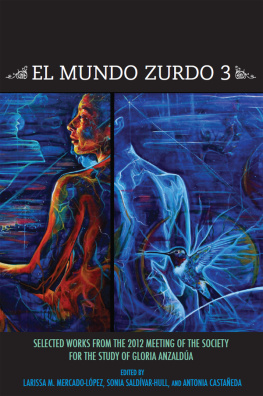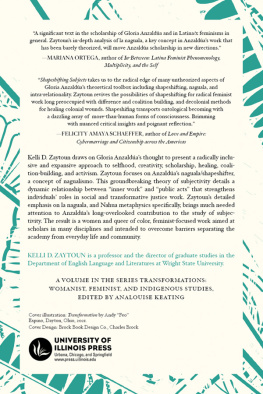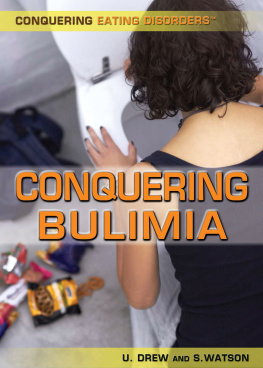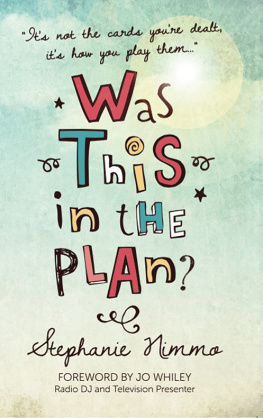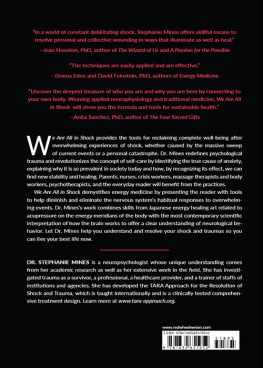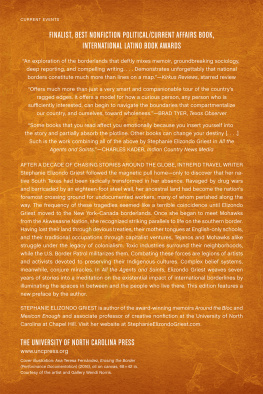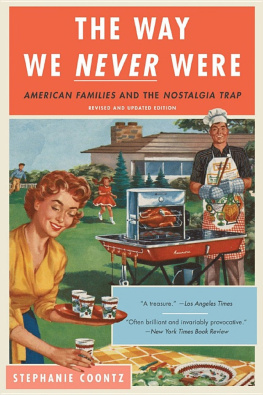Copyright 2013 by the Society for the Study of Gloria Anzalda
All rights reserved. This book, or parts thereof, must not be reproduced in any form or by any means, electronic or mechanical, including photocopying and recording, or by an information storage and retrieval system, without written permission from the publisher.
Aunt Lute Books
P.O. Box 410687
San Francisco, CA 94141
www.auntlute.com
Cover design: Amy Woloszyn, Amymade Graphic Design
Cover art: 2012 Liminal Incubation by Adriana M. Garca
Text design: Amy Woloszyn, Amymade Graphic Design
Senior Editor: Joan Pinkvoss
Managing Editor: Shay Brawn
Production: Laura Chin, Learkana Chong, Ellen French, Lisa Hastings, Taylor Hodges, Kara Owens, Erin Peterson, Allison Power
Library of Congress Cataloging-in-Publication Data
El Mundo Zurdo 3 : Selected Works from the 2012 Meeting of the Society for the Study of Gloria Anzalda / edited by Larissa Mercado-Lpez, Sonia Saldvar-Hull, and Antonia Castaeda.
pages cm
ISBN 978-1-879960-89-3 (acid-free paper)
1. Anzalda, Gloria--Criticism and interpretation. 2. Mexican Americans in literature. I. Merca-do-Lpez, Larissa, editor of compilation. II. Saldvar-Hull, Sonia, 1951- editor of compilation. III. Castaeda, Antonia, editor of compilation.
PS3551.N95Z794 2013
818.5409--dc23
2013038532
Printed in the U.S.A. on acid-free paper
10 9 8 7 6 5 4 3 2 1
INTRODUCTION
CHANGE IS INEVITABLE, NO BRIDGE LASTS FOREVER: CONOCIMIENTO AS AN EPISTEMOLOGY OF TRANSFORMATION
LARISSA M. MERCADO-LPEZ
The theme for El Mundo Zurdo 2012, Transformations, was proposed in the summer of 2011, in anticipation of the Mayan prediction of a global transformation that was expected to occur as the Mayan calendar cycle came to a close that following December. While apocalypse watchers searched for signs of a cataclysmic event, others looked forward to a global change of consciousness and spiritual renewalthe possibility of a world that would more closely resemble Gloria Anzaldas vision of el Mundo Zurdo. The organizing committee, hoping to draw papers that documented the transformative effects of Anzaldan theory within academia, social movements, and creative expression, agreed that Transformations would effectively bring together a cadre of artists, scholars, and community activists whose works were invested in the project of realizing el Mundo Zurdo and fostering conocimiento in their respective classrooms and communities. While the ongoing political debates surrounding immigration and ethnic studies reminded those of us in the areas of Chicana/o and Latina/o studies that we were and continue to be in times of great opposition, Anzaldas work shows us that it is within oppressive contexts that conocimientoknowledgeunfolds and transformation begins (Reader 320).
Knowledge is, and has always been, political and a site of struggle. Who can create knowledge? Who gets to decide which knowledge counts? These questions are worthy of being asked, Rusty Barcel declares in her keynote address, but, she continues, [I]t is wewho were barred for so long from access to knowledge and its creation in the academywho have been struggling for decades to change the answers. We have brought our own ways of knowing and being to our institutions; we have transformed our institutions; and yet the transformation is incomplete. Colonial projects have long focused their attacks on the intellectual traditions, methods of transmitting histories, and spiritual practices of indigenous peoples to delegitimize indigenous thought. From the beginning pages of Borderlands/La Frontera: The New Mestiza to now let us shift, Anzalda insists that we recognize the long neo/colonial history of epistemicide in the Americas that was and continues to be deployed through military invasion, historical erasure, and academic imperialism. However, as Anzalda has made evident, it is through this attempted erasure from which an epistemology of la mestiza has emerged, what she calls conocimiento.
Even more profound than its literal translation to knowledge, Anzaldas conocimiento in its fullest form is an ethical, compassionate strategy with which to negotiate conflict and difference within self and between others (now let us shift 545). She states,
A form of spiritual inquiry, conocimiento is reached via creative actswriting, art-making, dancing, healing, teaching, meditation, and spiritual activism Breaking out of your mental and emotional prison and deepening the range of perception enables you to link inner reflection and visionthe mental, emotional, instinctive, spiritual, and subtle bodily awarenesswith social, political action and lived experiences to generate subversive knowledges. (541-542)
In the introduction to Bridging: How Gloria Anzaldas Work and Life Transformed Our Own, AnaLouise Keating elaborates on the inner reflection and vision and public acts of conocimiento, explaining that Anzaldas intense focus on the personal always leads outward, enabling her to develop new insights and make connections with others; with this new knowledge and these connections with others, she facilitates social change (2). Kelli Zaytouns concept of the self-incoalition describes this movement outward as this coalitional self requires that we explore our own and each others specific journeys and situations and the inextricable connections between them. Likewise, Kandace Creel Falcn writes of the pedagogical applications of Anzaldas imperative to focus on the personal to forge connections with others. Recounting her experiences as an assistant professor, Falcn articulate[s] the value in exploring our own experiences and positions within writing, creative and scholarly endeavors for transformative work, especially within the Womens and Gender Studies classroom.
For Anzalda and many academics committed to social justice scholarship, the classroom has always been a site of conflict over knowledge. The most evident proof is the battle over Mexican American Studies in Arizona (and throughout the country), namely the concerted efforts to systemically suppress the conocimientos of Chicana/o youth that emerge from and are validated through the consciousness-raising curricula of ethnic studies courses. Recognizing the transformational potential of these conocimientos, lawmakers have eliminated teachers and banned books in their efforts to subdue the growing consciousness of an enlightened youth. Indeed, Anzalda would agree that epistemicide is being wielded once again as a weapon of neo-colonization.
However, as those in Chicana/o studies and other social justice-centered area studies experience and even lead counterattacks on the opposition to ethnic studies in their communities and universities, many have found that the spaces previously perceived as safe and welcoming of alternative knowledges are oftentimes harbors of institutional violence; in fact, Anzaldas own works were largely produced in and in response to such spaces. In their essay Stephanie Alvarez, et al, describe the hostile reaction to the Gloria Anzalda exhibit they created at Anzaldas alma mater, the University of Texas, Pan American, to bring her work into a space where she had been institutionally invisible. Citing Anzaldas assertion that Conocimiento pushes us into engaging the spirit in confronting our social sickness with new tools and practices whose goal is to effect a shift (Reader 311), the authors explain that The new tools and practice for us were the creation of the exhibit in the hopes to create a shift in us and the public; further, they hoped to subvert and re-work borders between academia and community in order to introduce Anzaldas mestiza consciousness to a public that has not had access to it. Clearly, conocimiento has the power to mobilize people toward spiritual activism.
Next page
